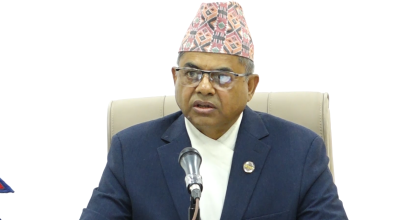
KATHMANDU: Chief Minister of Lumbini Province, Shankar Pokhrel, today resigned from his post. Pokhrel submitted his resignation to Province Chief Amik Sherchan, according to Province Assembly CPN (UML)’s Chief Whip Bhumishwor Dhakal.
The opposition alliance has proposed CPN (Maoist Centre)’s parliamentary leader Kul Prasad KC as the future Chief Minister of Lumbini.
Pokhrel was elected to the Province Assembly from the Dang constituency 2 (1) through the electoral alliance between the CPN (UML) and the CPN (Maoist Centre).
In the resignation letter, Pokhrel stated that though the Constitution did not entertain the vote of no-confidence against the Chief Minister appointed as per the Article 188 (4) until the first two years of the appointment on the post, he was aware of trying to seek the vote of confidence at an appropriate time bearing in mind the issues raised in the Province Assembly since sometime, and thus his resignation from the post.
He said he was resigning from the post in accordance with Article 169 (1) of the Constitution to pave the way out of the existing political confusion.
Thirty-four province assembly members of four parties in the opposition alliance had filed no-confidence motion against the Chief Minister for the third time on August 3. Before this, no-trust motion was filed against CM Pokhrel on April 19.
Pokhrel had tendered his resignation in the morning of May 2, the day when a meeting was called to hold discussion on the no-trust motion. He was appointed to the post of Chief Minister for the second time on the same day, claiming solo majority of the CPN (UML).
Out of 87-member province assembly, there are now 80 members. There is a need of 41 province assembly members to form a majority government. It is said that the opposition alliance has 41 members—19 from the Nepali Congress, 18 from CPN (Maoist Centre), three from Janata Samajbadi Party and one from Janamorcha.
Meanwhile, Chief Minister Pokhrel met with employees soon after tendering his resignation as a farewell call.
Addressing them, he said that it was necessary to further strengthen federalism as the government employees, considered as permanent government, have key role.
He shared that his government became successful to formulate periodic plan of the province within a year of the formation of the government, adding effective activities were carried out during his term.
The Lumbini Province, out of seven provinces, became successful to formulate policy, programme and budget along with systematic action on the basis of the periodic plan, added Pokhrel.












